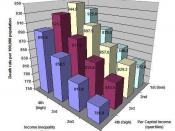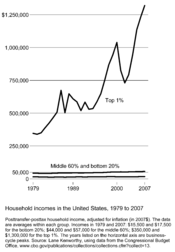Business Ethics & Professional Responsibility - Should the United States Care About Income Inequality?
Income inequality represents a threat to US political, social and economic stability and should be addressed via a progressive tax code directed towards promoting social mobility.
Why should we care about income inequality?
1. Income inequality impacts the United States' well-being via reduced overall marginal utility. The consumption of wealthy has less marginal utility than consumption of the poor struggling for basic resources. Simply, a $1,000 increase in income means a lot more to a family of four living at the poverty line with an income of $23,850 than it does to a family with an income in the hundreds of thousands of dollars or above. A poor family is likely to use additional income to satisfy basic needs such as food, clothing, and shelter whereas a high income family is likely to either save the additional income and receive no utility or will spend the additional income on goods that satisfy wants but not needs.
Research studies have confirmed this notion of that marginal utility (as measured by happiness) of income does indeed decline with greater incomes. Satisfying basic needs generates more benefits to society than satisfying extravagant wants. The founder of utilitarianism, Jeremy Bentham, believed it to be a principle of greatest-happiness. Member of society should always act in a manner that generates the most happiness for all in society. At its most basic, utilitarianism considers all forms of happiness equal. John Stewart Mills refined Bentham's idea into the concept of higher and lower forms of happiness. Mills explained his demarcation when he wrote, "It is better to be a human being dissatisfied than a pig satisfied; better to be Socrates dissatisfied than a fool satisfied." Both notions of measuring happiness may seem...


